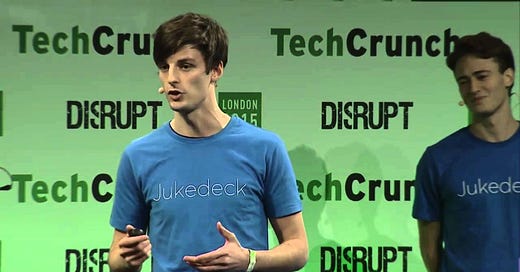There was no reply to Sony Music’s open letter to 700 AI companies published five months ago, at least to my knowledge. The letter warned against “unauthorized use” of its music catalog in generative AI training. Ignoring the warning, startups like Suno and Udio carried on with business as usual and later found themselves slapped with lawsuits from Sony, Universal Music Group, and Warner Records.
Even though they were not targeted in the lawsuit, one could argue that Stability AI fired the first shot. Back in October of 2023, they filed a motion with the US Copyright Office arguing that the AI training of copyrighted music for their Stable Audio platform should be protected under the ‘fair use’ exception in copyright law.
Not only did this trigger the ire of the music industry, but it also caused Ed Newton-Rex, Stability AI’s VP of audio, to resign publicly, citing disagreement with his employer's “fair use” claim:
“Companies worth billions of dollars are, without permission, training generative AI models on creators’ works, which are then being used to create new content that in many cases can compete with the original works. I don’t see how this can be acceptable in a society that has set up the economics of the creative arts such that creators rely on copyright.”
Fast forward to now. Ed Newton-Rex is head of a company called Fairly Trained, an ethics-driven company that offers certification for any “generative AI model that doesn’t use any copyrighted work without a license.” The startup is supported by Universal Music Group, SAG-AFTRA, and The Author’s Guild.
Fairly Trained is behind a petition of 11,000 creative professionals that headlined this week. Many famous musicians, writers, and actors are signatories, including Thom Yorke of Radiohead and The Smile. (I listened to their new album Cutouts as I wrote this article, drifting along on beautiful piano melodies overlaid with syncopated beats, twisted guitar riffs, and Thom’s inimitable falsetto. But I digress.) The petition is a big deal and signifies an ever-growing movement among creative professionals to stand up for their rights as artists and push back against the blatant piracy and tyranny of some of the most well-known AI companies and Big Tech.
If you thought the flames of protest had died down since the Hollywood writer's strike last year and the SAG-AFTRA video game strike this year, you must have missed the smoke still rising. I think this movement is just getting started, and it will gain strength as more lawsuits are launched amidst growing public awareness.
But I wonder, is Ed Newton-Rex a bit of a wolf in sheep’s clothing? It’s admirable that he quit a very high-paying job for a good cause that he appears to truly believe in, but fighting for artists to receive fair compensation and the right to opt out of AI training models by default is really only half the battle and leaves out an important question: What is the end goal of generative AI?
Ed has been pursuing the dream of AI-generated music since graduating from Cambridge University in 2010 and as recently as seven months ago was at a speaking event explaining the history of AI music and perpetuating the myth of the "democratization of art", something which famous Luddite Brian Merchant finds (rightly) insulting. In the YouTube video, Newton-Rex says that generative AI will make music production “cheaper and more accessible” and that’s fine because “people will never stop being creative,” which is either an uncharacteristically naive or wilfully ignorant line of thinking.
What does he think will be the result of AI-generated music flooding the labor market, even if it's ethically sourced? Just like the stock photo industry, AI-generated music is already disrupting the livelihood of musicians who create things like stock background music and sound effects for commercials, podcasts, and video games. It’s only logical that as AI technology progresses, the whole point is to disrupt the music industry and take a slice of the economic pie that was once only shared by humans. Do Ed’s friends in the music industry realize they're breaking bread with the enemy?
Still, despite having to unleash a huge sigh of disappointment about the disingenuous or oblivious nature of so many people in the AI industry — even the so-called good guys — it’s great to see the creative industry speaking up. I hope they continue to win the battle for their rights and the future of their respective crafts. The world will be an achromatic and monotonous sphere of mediocrity if creators are displaced by sterile, dehumanizing machines.







